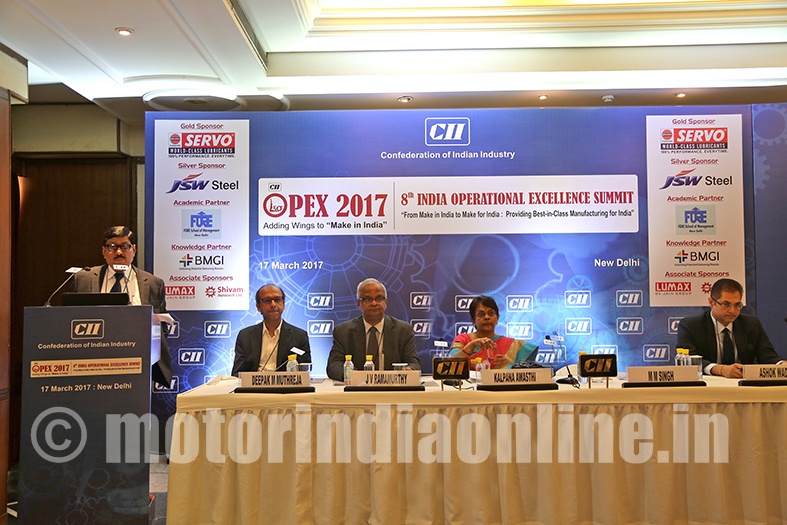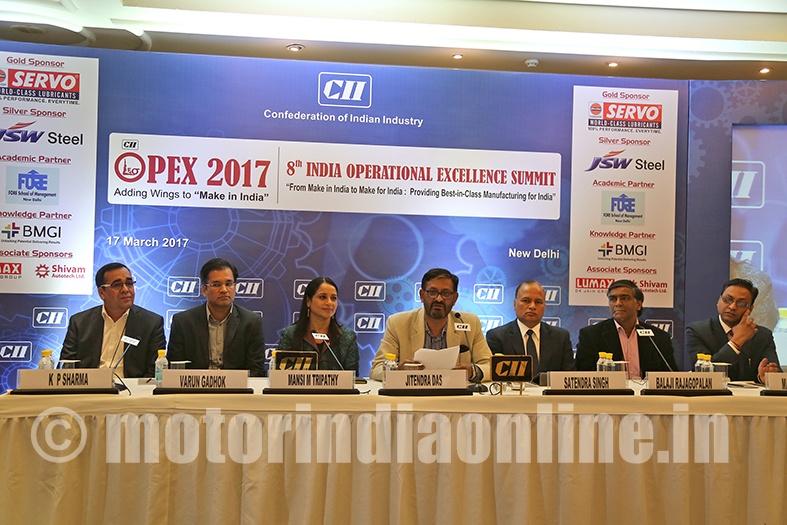The slogan ‘Adding Wings to Make in India’ for the OPEX 2017 Summit could not have been any better. Ever since PM Narendra Modi appealed “Come, make in India … Sell anywhere, (but) make in India” four years back, the Indian industry has definitely been excited and zealous, but mere excitement cannot make it a roaring lion amid global foxes and giant hyenas. It has to decide on basic economic questions like ‘how to make and for whom’, and expand its capabilities, while simultaneously improving production efficiency and service delivery. The 8th India Operational Excellence Summit organised by Confederation of Indian Industries (CII) on March 17, 2017 at New Delhi was meant to answer those essential economic questions under the clout of the ‘Make in India’ campaign. The summit themed ‘From Make in India to Make for India: Providing Best-in-Class Manufacturing for India’ focussed on leveraging operational excellence in designing and producing products and services for the Indian market, thereby adding wings for the campaign to take-off.

“Operational Excellence is a crucial factor for productivity and competition across all sectors that can create ripple effects”, said Mrs. Kalpana Awasthi, Director General of National Productivity Council (NPC), adding that a two-pronged approach of lean manufacturing and embracing Industry 4.0 can set new benchmarks for firms. She also stressed on the importance of ‘triple bottom line’ principle of NPC involving Economy, Environment, and Society in today’s industry for ensuring sustainability. Speakers at the summit shared their success stories and best practices on how methods of Operational Excellence can help in achieving optimum profitability.
Automotive Industry under ‘Make for India’
The Indian automotive industry is predicted to emerge as a largest global manufacturing hub over the next decade. Yet, the expanding domestic market with a large and diverse consumer base holds great potential and can be the biggest driving force of profitability under the ‘Make in India’ impetus. “The scope of ‘Make for India’ is integral to the prevailing campaign, but requires operational excellence in the entire automotive supply chain”, said Mr. M.M. Singh, Co-Chairman and Executive Advisor, Maruti Suzuki India Ltd. Drawing from the growth and excellence of his company in this regard, he stressed on operational excellence in four key aspects of automotive business, namely products, place (market), time, and price.

On a similar note, Ms. Mansi Madan Tripathy, Country Head, Shell Lubricants India Cluster, shared her company’s experience on the development of Shell Rimula R1 multi-purpose diesel engine oil, which was initially conceived as a rural India product but later entered the brand’s international portfolio. She also cited the innovation of pouch packaging for the domestic market which later on went global, agreeing that designing for Indian customers and delivering best-in-class promises should go hand-in-hand in the current scenario of local production in India.
On the possibility of mass customising automotive products and services for the Indian consumers, Mr. Pankaj Dubey, CEO and Director of Eicher Polaris Pvt. Ltd., said that consumer preference and products are mutually sensitive to each other, thereby each trying to influence the other in myriad ways. The Eicher Polaris Multix personal utility vehicle is a unique project in this regard, catering to the multi-purpose applications of mobility in both rural and urban India. The speakers agreed that manufacturing in India has to be reimagined, incorporating operational excellence and standardisation of products. The consumer, on his part, has to prioritise his needs for mass customisation to succeed in India – a trend of consumer behaviour that is already visible in automotive sector. In such a scenario of mass customisation and hyper-local requirements, “auto makers and logistics service providers have to evolve a consumer-centric supply chain involving speed, sensitivity, cost, and efficiency”, said Ms. Gazal Kalra, CEO, Rivigo.
The ‘Make in India’ does pose some significant challenges to firms, like disruption of global scale, increased complexity of business models within the firms, quality challenges, etc. Under the prevailing business models, local manufacturing in India may not offer enough benefits not just for the industry, but also for the market. Thus, adhering to operational excellence in the entire value chain, along with a step-by-step approaches to mass customisation for Indian consumers can help evolve a productive and profitable business model under ‘Make in India’. This shifts the focus to ‘Make for India’, thereby providing best-in-class manufacturing in India.